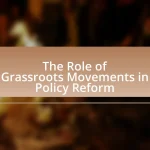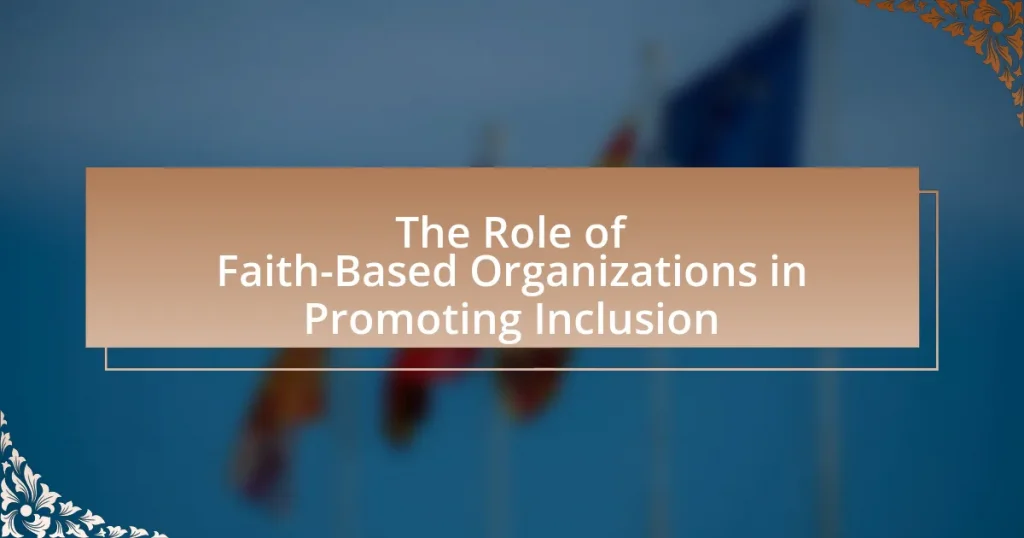Faith-based organizations play a vital role in promoting inclusion by engaging with marginalized groups and advocating for social justice. They define inclusion as the active acceptance of diverse backgrounds, emphasizing principles such as acceptance, accessibility, and participation. Various faith traditions approach inclusion through teachings that promote community and compassion, while these organizations face challenges like doctrinal rigidity and community resistance. By implementing outreach initiatives and collaborating with other entities, faith-based organizations enhance community cohesion and support, ultimately fostering environments where all individuals feel valued and included.
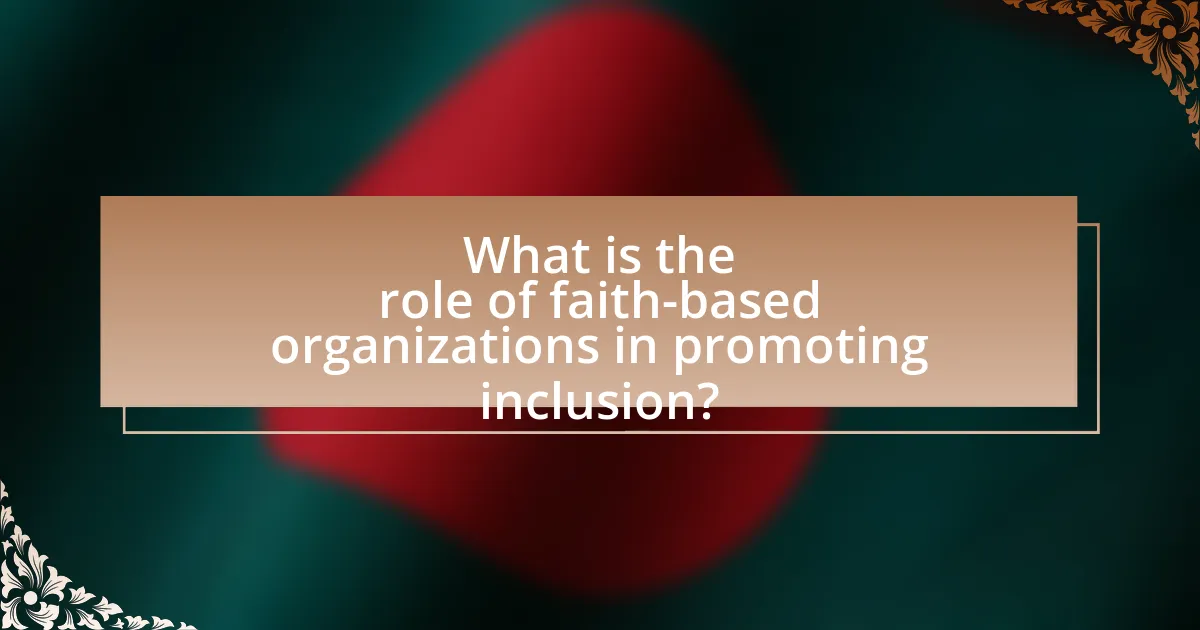
What is the role of faith-based organizations in promoting inclusion?
Faith-based organizations play a crucial role in promoting inclusion by fostering community engagement and providing support to marginalized groups. These organizations often serve as platforms for social justice initiatives, advocating for the rights of individuals facing discrimination based on race, gender, or socioeconomic status. For instance, many faith-based groups actively participate in interfaith dialogues and community service projects that aim to bridge divides and promote understanding among diverse populations. Research indicates that faith-based organizations are instrumental in mobilizing resources and volunteers, which enhances their capacity to address social issues effectively. Their commitment to inclusivity is often rooted in religious teachings that emphasize compassion and equality, making them vital players in efforts to create more inclusive societies.
How do faith-based organizations define inclusion?
Faith-based organizations define inclusion as the active engagement and acceptance of individuals from diverse backgrounds, ensuring that everyone has equal access to resources, opportunities, and participation within the community. This definition is rooted in the belief that all individuals are created with inherent dignity and worth, often supported by religious teachings that emphasize love, compassion, and respect for all people. For instance, many faith traditions advocate for the inclusion of marginalized groups, such as the poor, disabled, and minorities, reflecting a commitment to social justice and equity.
What are the key principles of inclusion in faith-based contexts?
The key principles of inclusion in faith-based contexts are acceptance, accessibility, and participation. Acceptance involves recognizing and valuing the diversity of individuals within the faith community, ensuring that all members feel welcomed regardless of their background. Accessibility refers to creating environments and practices that allow everyone, including those with disabilities or marginalized identities, to engage fully in religious activities. Participation emphasizes the importance of involving all members in decision-making processes and community life, fostering a sense of belonging and ownership. These principles are supported by various faith traditions that advocate for love, compassion, and justice, reinforcing the idea that inclusivity is a fundamental aspect of spiritual practice.
How do different faith traditions approach the concept of inclusion?
Different faith traditions approach the concept of inclusion through various theological and ethical frameworks that emphasize community, compassion, and acceptance. For instance, Christianity often highlights the teachings of Jesus, which advocate for love and acceptance of all individuals, regardless of their background, as seen in the parable of the Good Samaritan. In Islam, the concept of Ummah promotes a sense of community that transcends ethnic and social barriers, emphasizing that all believers are equal in the eyes of God. Buddhism teaches inclusivity through the principle of compassion, encouraging followers to extend kindness to all sentient beings. Hinduism, with its diverse practices, often embraces inclusion through the concept of Dharma, which calls for respect and acceptance of different paths to spirituality. These approaches illustrate how faith traditions can foster inclusive environments, promoting social cohesion and mutual respect among diverse groups.
Why are faith-based organizations important for promoting inclusion?
Faith-based organizations are important for promoting inclusion because they often serve as community hubs that foster social cohesion and support marginalized groups. These organizations leverage their moral authority and community trust to advocate for the rights of individuals facing discrimination, thereby enhancing social inclusion. For instance, a study by the Pew Research Center found that faith-based initiatives significantly contribute to social services, providing food, shelter, and counseling to diverse populations, which helps integrate individuals into society. Additionally, faith-based organizations frequently engage in interfaith dialogues that promote understanding and acceptance among different cultural and religious groups, further reinforcing their role in fostering an inclusive environment.
What unique resources do faith-based organizations offer for inclusion efforts?
Faith-based organizations offer unique resources for inclusion efforts, including community networks, moral authority, and access to diverse populations. These organizations often have established relationships within their communities, enabling them to mobilize volunteers and resources effectively. Their moral authority can influence attitudes and behaviors towards marginalized groups, fostering acceptance and understanding. Additionally, faith-based organizations frequently serve as safe spaces for dialogue and support, providing essential services such as food, shelter, and counseling, which are crucial for promoting social inclusion.
How do faith-based organizations influence community attitudes towards inclusion?
Faith-based organizations influence community attitudes towards inclusion by promoting values of compassion, acceptance, and social justice rooted in their teachings. These organizations often engage in outreach programs that foster dialogue and understanding among diverse groups, thereby challenging prejudices and stereotypes. For instance, studies have shown that faith communities that actively participate in interfaith initiatives report higher levels of acceptance towards marginalized groups, as evidenced by the 2018 report from the Pew Research Center, which found that 70% of participants in interfaith dialogues expressed increased openness to different cultures and beliefs. Through their advocacy and community service, faith-based organizations play a crucial role in shaping positive perceptions of inclusion within their communities.
What challenges do faith-based organizations face in promoting inclusion?
Faith-based organizations face several challenges in promoting inclusion, primarily stemming from doctrinal beliefs, community resistance, and resource limitations. Doctrinal beliefs can create barriers when certain groups are viewed as incompatible with the organization’s values, leading to exclusionary practices. Community resistance often arises from cultural norms or prejudices that conflict with the inclusive goals of these organizations, making it difficult to foster acceptance. Additionally, resource limitations, including funding and volunteer support, hinder the ability of faith-based organizations to implement effective inclusion programs. These challenges collectively impede the progress of faith-based organizations in creating inclusive environments.
What internal barriers exist within faith-based organizations regarding inclusion?
Internal barriers within faith-based organizations regarding inclusion include doctrinal rigidity, resistance to change, and lack of awareness or understanding of diversity issues. Doctrinal rigidity often leads to exclusionary practices that prioritize specific beliefs over inclusivity, limiting the participation of diverse groups. Resistance to change can stem from established traditions and leadership structures that are hesitant to adapt to evolving societal norms. Additionally, a lack of awareness or understanding of diversity issues can result in unintentional discrimination, as members may not recognize the importance of inclusive practices. These barriers hinder the ability of faith-based organizations to fully embrace and promote inclusion within their communities.
How do external societal factors impact the efforts of faith-based organizations?
External societal factors significantly influence the efforts of faith-based organizations by shaping their operational environment and community engagement strategies. For instance, socioeconomic conditions, such as poverty rates and unemployment levels, directly affect the demand for services provided by these organizations, compelling them to adapt their programs to meet the needs of vulnerable populations. Additionally, cultural attitudes towards religion and diversity can either facilitate or hinder collaboration between faith-based organizations and other community entities, impacting their ability to promote inclusion effectively. Research indicates that in areas with high levels of social cohesion, faith-based organizations are more successful in fostering inclusive practices, as seen in studies conducted by the Pew Research Center, which highlight the correlation between community support and the effectiveness of faith-based initiatives in addressing social issues.
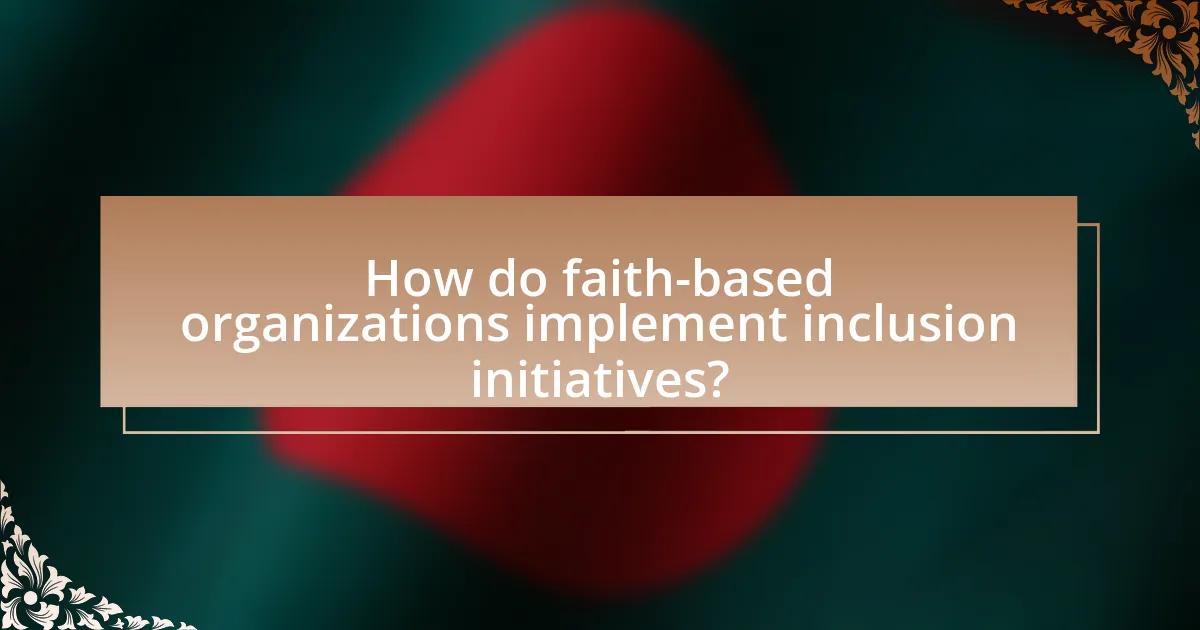
How do faith-based organizations implement inclusion initiatives?
Faith-based organizations implement inclusion initiatives by creating programs that promote diversity and accessibility within their communities. These organizations often establish outreach efforts that engage marginalized groups, ensuring their participation in religious activities and community services. For instance, many faith-based organizations provide resources such as language translation services, disability accommodations, and targeted support for underrepresented populations. Research indicates that inclusive practices in faith communities can lead to increased participation rates among diverse groups, fostering a sense of belonging and community cohesion.
What types of programs do faith-based organizations create to promote inclusion?
Faith-based organizations create various programs to promote inclusion, including community outreach initiatives, interfaith dialogues, and social justice advocacy. Community outreach initiatives often involve food banks, shelters, and support services that cater to marginalized groups, fostering a sense of belonging. Interfaith dialogues encourage understanding and cooperation among different religious communities, promoting inclusivity through shared values and collaborative projects. Social justice advocacy programs focus on addressing systemic inequalities, empowering individuals through education and resources, and advocating for policy changes that support marginalized populations. These programs are designed to create environments where all individuals feel valued and included, regardless of their background.
How do educational programs within faith communities foster inclusion?
Educational programs within faith communities foster inclusion by creating environments that promote understanding, respect, and collaboration among diverse groups. These programs often incorporate teachings that emphasize the value of every individual, regardless of their background, which helps to break down barriers and stereotypes. For instance, many faith-based educational initiatives include multicultural events, workshops, and discussions that encourage participants to share their experiences and perspectives, thereby enhancing empathy and social cohesion. Research indicates that faith communities that actively engage in inclusive educational practices see increased participation from marginalized groups, leading to a more integrated community.
What role do outreach initiatives play in promoting inclusion?
Outreach initiatives play a crucial role in promoting inclusion by actively engaging marginalized communities and facilitating their access to resources and opportunities. These initiatives, often led by faith-based organizations, create platforms for dialogue, education, and support, which help to break down barriers of discrimination and social isolation. For instance, a study by the Pew Research Center found that faith-based outreach programs significantly improve community cohesion and participation among diverse groups, fostering an environment where individuals feel valued and included.
How do faith-based organizations collaborate with other entities for inclusion?
Faith-based organizations collaborate with other entities for inclusion by forming partnerships with community groups, government agencies, and non-profit organizations to address social issues. These collaborations often involve joint initiatives that leverage resources, expertise, and networks to promote diversity and support marginalized populations. For instance, a study by the Pew Research Center highlights that faith-based organizations frequently engage in community service projects alongside local governments to enhance social cohesion and provide essential services, such as food assistance and housing support, thereby fostering an inclusive environment.
What partnerships are common between faith-based organizations and local governments?
Common partnerships between faith-based organizations and local governments include collaboration on social services, community development initiatives, and disaster response efforts. These partnerships often leverage the outreach capabilities of faith-based organizations to address local needs, such as food assistance programs, housing support, and health services. For instance, the U.S. Department of Health and Human Services has recognized faith-based organizations as vital partners in delivering social services, highlighting their role in effectively reaching underserved populations. Additionally, local governments frequently engage faith-based groups in emergency management planning, as these organizations can mobilize community resources and volunteers during crises.
How do faith-based organizations work with non-profits to enhance inclusion efforts?
Faith-based organizations collaborate with non-profits to enhance inclusion efforts by leveraging their community networks and resources to reach marginalized populations. These organizations often provide essential services such as food assistance, housing support, and educational programs, which are crucial for fostering inclusion. For instance, a study by the Pew Research Center indicates that faith-based groups are instrumental in addressing social issues, as they often have established trust within communities that non-profits may not have. Additionally, faith-based organizations frequently engage in advocacy work alongside non-profits to promote policies that support inclusivity, demonstrating their commitment to social justice and equity.
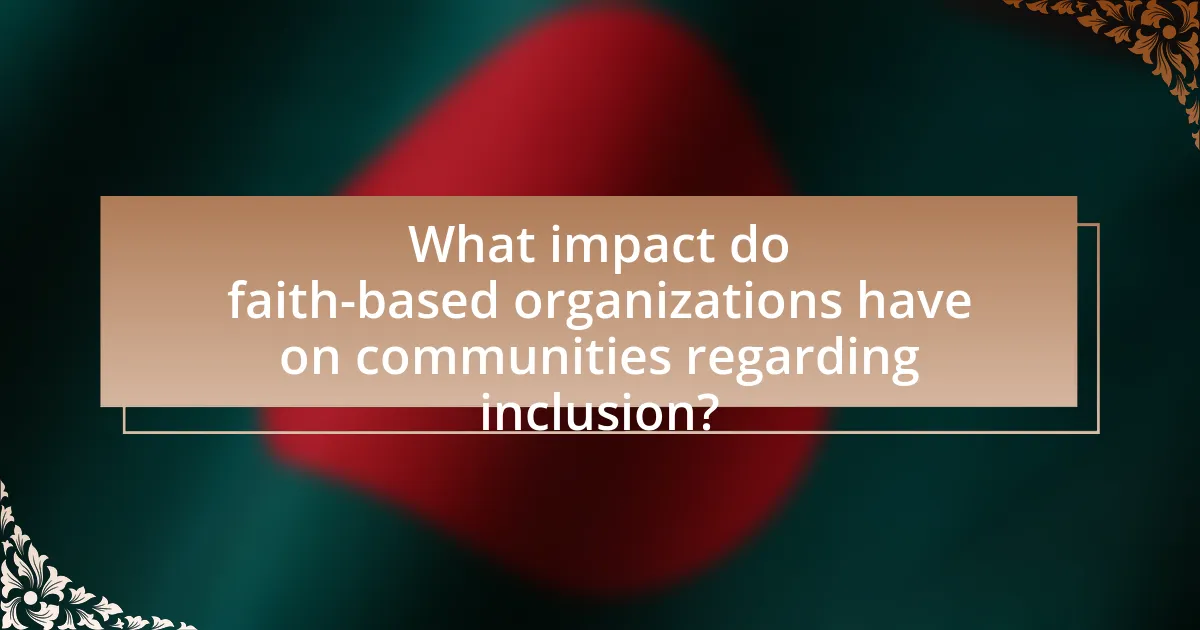
What impact do faith-based organizations have on communities regarding inclusion?
Faith-based organizations significantly enhance community inclusion by fostering social cohesion and providing support to marginalized groups. These organizations often serve as safe spaces where individuals from diverse backgrounds can come together, promoting dialogue and understanding. For instance, a study by the Pew Research Center found that faith-based initiatives often lead to increased volunteerism and community engagement, which are critical for building inclusive environments. Additionally, faith-based organizations frequently advocate for social justice and equality, addressing systemic barriers that hinder inclusion, as evidenced by their involvement in various civil rights movements throughout history.
How do faith-based organizations measure their success in promoting inclusion?
Faith-based organizations measure their success in promoting inclusion through various metrics, including community engagement, diversity in leadership, and participation rates in inclusive programs. These organizations often track the demographic diversity of their congregations and the extent to which marginalized groups feel welcomed and represented. For instance, surveys and feedback mechanisms are utilized to assess the experiences of individuals from diverse backgrounds, providing quantitative and qualitative data on their sense of belonging. Additionally, successful initiatives may be evaluated based on the number of partnerships formed with other community organizations that focus on inclusion, as well as the impact of outreach programs aimed at underrepresented populations.
What metrics are used to evaluate the effectiveness of inclusion initiatives?
Metrics used to evaluate the effectiveness of inclusion initiatives include employee demographics, retention rates, employee engagement surveys, and participation in training programs. Employee demographics provide insights into the diversity of the workforce, while retention rates indicate the success of initiatives in keeping diverse talent. Employee engagement surveys measure the perceptions and experiences of employees regarding inclusion, and participation in training programs reflects the commitment to fostering an inclusive environment. These metrics collectively help organizations assess the impact of their inclusion efforts and identify areas for improvement.
How do success stories from faith-based organizations inspire further inclusion efforts?
Success stories from faith-based organizations inspire further inclusion efforts by demonstrating effective models of community engagement and support. These organizations often showcase successful initiatives that address social issues, such as poverty alleviation and discrimination, which can motivate other groups to adopt similar inclusive practices. For instance, the success of programs like the Catholic Charities’ Refugee Resettlement initiative has led to increased collaboration among various community stakeholders, highlighting the impact of faith-based approaches in fostering inclusive environments. Such tangible outcomes serve as proof that faith-driven efforts can lead to meaningful change, encouraging others to replicate these models in their own contexts.
What best practices can faith-based organizations adopt to enhance inclusion?
Faith-based organizations can enhance inclusion by implementing diverse leadership structures that reflect the community they serve. This practice ensures representation and fosters a sense of belonging among various demographic groups. Research indicates that organizations with diverse leadership are more effective in addressing the needs of their constituents, as they bring varied perspectives and experiences to decision-making processes. For instance, a study by the Harvard Business Review found that diverse teams are 35% more likely to outperform their homogeneous counterparts. Additionally, faith-based organizations should actively engage in community outreach programs that prioritize marginalized groups, thereby creating opportunities for participation and collaboration. This approach not only builds trust but also strengthens community ties, leading to a more inclusive environment.
How can faith-based organizations engage their communities more effectively?
Faith-based organizations can engage their communities more effectively by fostering inclusive programs that address local needs and encourage participation. By conducting community assessments to identify specific issues, such as food insecurity or mental health support, these organizations can tailor their outreach efforts. For instance, a study by the Pew Research Center found that 70% of faith-based organizations reported increased community engagement when they offered services directly aligned with community needs. Additionally, creating partnerships with local businesses and nonprofits can enhance resource sharing and broaden outreach, leading to a more significant impact on community cohesion and support.
What strategies can be employed to overcome resistance to inclusion within faith communities?
To overcome resistance to inclusion within faith communities, strategies such as education, dialogue, and leadership engagement can be employed. Education initiatives can raise awareness about the importance of inclusion, highlighting its alignment with core religious values, as seen in various faith teachings that emphasize love and acceptance. Dialogue fosters understanding by creating safe spaces for discussions about diversity and inclusion, allowing members to express concerns and share experiences. Engaging faith leaders in promoting inclusive practices is crucial, as their influence can inspire congregations to embrace diversity, supported by studies showing that leadership commitment significantly impacts community attitudes towards inclusion.




